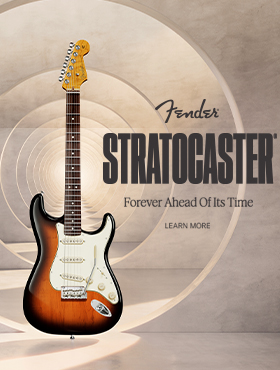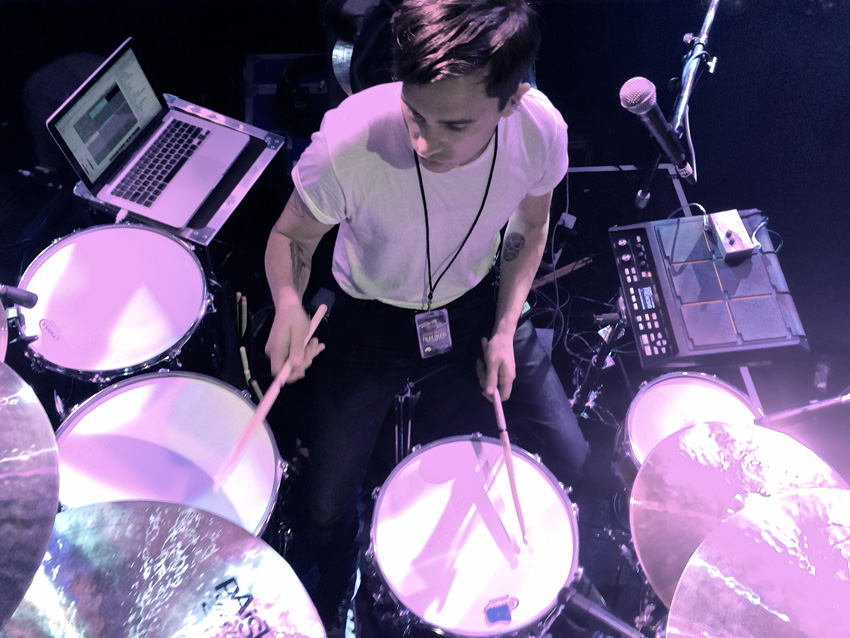 DAVE JENKINS JR
DAVE JENKINS JR
by Greg Phillips
In late June I witnessed a performance by local eccentric, electronic pop/rock artist Kirin J Callinan. In Kirin’s shows, there’s a large degree of audience interaction which often dictates what and how tunes are played. It struck me while watching, that his band was not only tight but needed to be on their toes, prepared for any curve balls which Kirin may throw at them. The drummer that night was DAVE JENKINS JR. While researching for this interview with Dave, it came as no surprise to learn that he is one of Australia’s most versatile and in-demand drummers. Jenkins Jr not only flits between playing with artists such as Kirin, Bertie Blackman, Eves and his own project Vigilantes, but is also called upon as a session drummer to face the unique challenges of TV shows like The Voice and X Factor. When I spoke to Yamaha drum endorsee Dave Jenkins Jr, he’d just come off a run of dates with former X Factor contestant Taylor Henderson and was attempting to schedule a ridiculous amount of work he has agreed to for the remainder of the year.
What was the spark which lit your flame for drums initially?
As my name implies, I’m a junior and my dad, Dave Jenkins is also a drummer. That’s where it came from. There were always drums around the house and he was always eager to teach me. I remember at the age of four sitting on a drum stool and dad trying to get me interested but I wasn’t really taking to it. A few years later at 7 or 8 I had a friend who was learning guitar at school. We decided to start a band because he had a guitar and I had a drum kit. It was then I went to dad and said, please teach me, show me more!
What was your first kit?
My dad always had kits but my first drum kit, which I got when I was about 9 was a Percussion Plus, a pretty cheap range of drums. I got that for being good at school, it was my reward.
You are a Yamaha drum endorsee. When did you first hook up with Yamaha?
I have played Yamaha kits for years but it’s only recently that I have hooked up with them and got an official endorsement. Basically from years of playing festivals and playing on TV shows with Yamaha kits being supplied as backline, they’ve just always been reliable. That’s the thing I have always liked about their kits and got me excited to play them … they just work. It doesn’t matter what model or where you get one, it’s always reliable.
What kit are you playing now?
The Yamaha Club Custom. I only got it in the last couple of months but they sound great. They’re kind of like a vintage kit but with modern hardware. I have always used vintage kits, which can be a bit flimsy at times. I have old kits where the bass drum legs give out if you kick it too hard but this new Yamaha kit is solid.
What’s your usual set up?
I generally use a 22″ kick, 12″ rack and 16″ floor with Paiste cymbals. I use Giant Beats and Paiste Signature Series as well.
Do you use the same kit on stage and in the studio?
I guess I am kind of a bespoke drummer. Because I play for a lot of different artists and in different styles, they all require different sounds. For Kirin’s stuff, I used Roto Toms for that particular set up. A lot of the sounds on his record are electronic sounds and there’s a lot of sampled tablas and other Indian percussion. The best way for me to work that into a playable kit is to use things like Roto Toms and triggers. It’s the same with recording … sometimes I will use bigger drums. I have a studio here in Sydney so I have a big collection of crap!
Is it different playing drums behind a lot of guitars as opposed to synths?
I think it is but it depends on the genre of music too. Some stuff just requires big loud solid beats. Certainly with Kirin’s stuff, it’s really eccentric music. It’s a lot of busy playing and keeping up with sequenced beats. When things are running from backing tracks and sequencers and stuff, you have really got to be playing as tight as possible. If you’re playing with a guitar band, you can keep it quite loose.
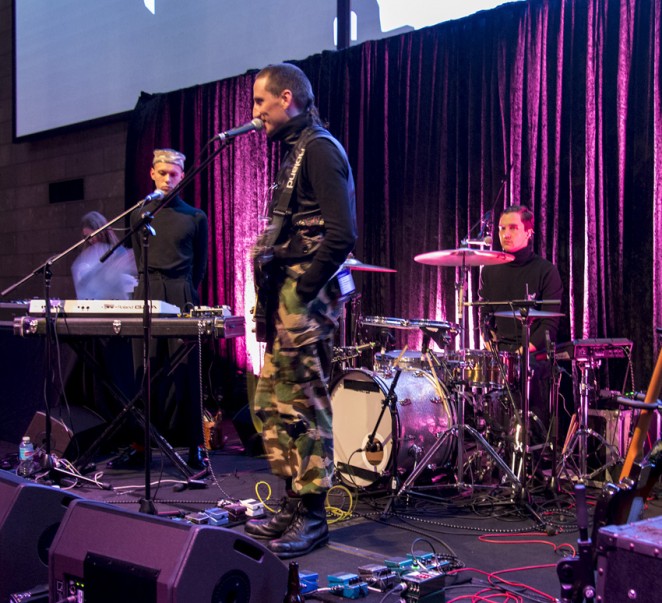 What’s happening with you and Kirin J Callinan now? Will you be playing with him in the future?
What’s happening with you and Kirin J Callinan now? Will you be playing with him in the future?
I have been playing with Kirin for about a year now, since his last record came out. It was interesting how that all came about. For the last 3 years I have played for primarily pop artists and for TV shows like The Voice and X Factor. But that’s never really been where my interests lie in terms of the kind of music I like and listen to. I have always liked Kirin’s music. He put a Facebook post up online and I had met him a few times, so we were friends on Facebook. His post said ‘Drummer wanted for world tour’ I got in touch with him and we met up at Rushcutters Park to play a game of soccer. He was like, OK can we meet up? Bring your footy boots! So I went to the park and played soccer with him and got the gig. So I have been playing with him for a year and it’s been really fun and also a really testing period. Some of the shows we have played have been all around the world in different conditions. We did a European tour last year and played a gig in Paris where we couldn’t actually fit a drum kit into the venue. Then we’d play massive venues for hundreds of people and then the next night might be Belgium or Amsterdam and there would be ten people there. It’s a real test of character.
Playing with a lot of different artists, what’s the secret to being such a versatile musician?
Something that I always think about is the whole natural ability versus learned skill side of things. A lot of drummers I see, you just watch and there is something about the way that feels great and it might not be the technicality or the fills they play. They might be playing something like Billie Jean, which is so straight but it feels really good. I think a lot of that comes with natural ability. Some people are born with a certain feel for music or drums specifically and that is something I am always interested by. Other drummers that I know will practice for 5 or 6 hours a day and technically they are amazing but a lot of the time they will be just missing that feel element. A lot of the time if I have come on board a gig or just filled in, there are a lot of comments about that. You will be playing exactly the same parts to someone else but the musicians will talk about how it felt. I think it is important to play your parts well and make it feel comfortable and right to the people you are playing with.
Are there any drum heroes that you believe have that feel?
When I was super-young my two biggest influences were my dad and Ringo Starr. That was the music I could play straight away as a child … The Beatles’ music. Just because the parts were so simple but that taught me from a really young age that you’ve got to play the parts that benefit the song overall. There is no point in overplaying or playing to your ego, you’ve to play what the song needs. I think that is something when listening to Beatles records, a lot of people will have an opinion of Ringo that he wasn’t a very good drummer but he was a tasteful drummer. For me, that was my biggest influence and one of the things that set me up as a drummer for life. Then as a teenager it was Stewart Copeland from The Police, who has always been one of my favourites. He has that feel element to his playing. He’s also quite a manic player, really hyperactive but you can really feel everything that he is doing. As soon as you hear his playing, you know it is him. For me that enforced the idea that you should impart some of your identity onto everything you do, even if it is just how you hit the cymbals or your fills. Also Keith Moon as well was a big one. I love the way he plays with melodies and he will play to the vocals.
What kind of challenges do shows like The Voice and X Factor throw up as a drummer?
For a lot of that stuff, it is about being perfect. I don’t tick all the boxes of a session musician in terms of technicality as a player. I am always working to be better but I find I am more of an expressive player. With stuff like The Voice and X Factor, I find it is about duplicating the parts that need to be played and play it as well as you can and as close to the original as possible, unless it is a new arrangement. I do Sunrise quite a lot too and whenever you are recording live on a TV show, there is no room for error. All of your hits have to be as dead on as you can and keep it as tight as possible. It is not something that is conducive to creative playing. It is also very challenging which is exciting though.
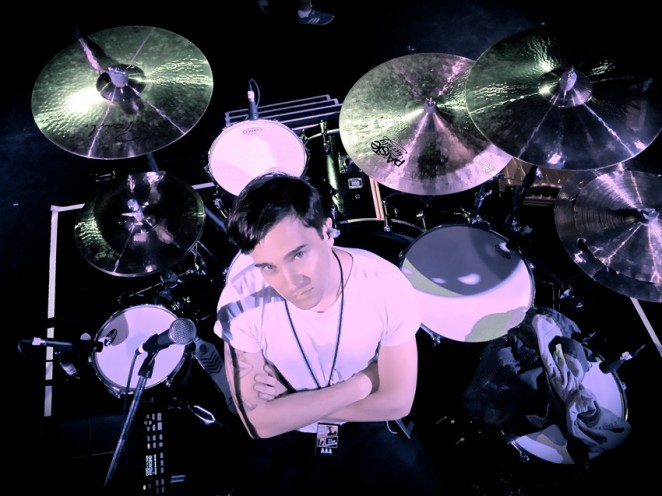 How do you choose your jobs? What’s your criteria?
How do you choose your jobs? What’s your criteria?
It is nice now because I am able to be a bit more selective with the jobs I choose but it hasn’t always been like that. I have been a professional drummer, since I quit my day job around four years now. I was doing bits and pieces but always had a day job. I worked in a music store, which is not too far removed from this. I’ve done all sorts of jobs though .. been a landscape gardener. My first job out of school was working at an adult store for a few years. I always had in the back of my mind that I was going to be famous or be this world-renowned musician. You know, just do anything for the time being. That’s how it has always felt since I was about nine years old. I never had a plan B. In terms of criteria for choosing artists and things I want to be involved in, it is finding the right balance between acts that you really want to be involved with and things that challenge you creatively but also there is the financial side of things, doing it as a job. You need things that are going to keep paying the rent. I balance it with a bit of both. I’ll play for a few major label pop artists but also balance that with my own music and with artists like Kirin and Bertie Blackman, whose music I really enjoy.
You have also been working with Eves a bit?
I have been working with Eves for about the last 6 months and she is incredible. I have never met such a young artist that has such an acute idea of where they want to be and how they want to be perceived, and the music they are making. It is quite incredible to talk to her and hear the things she has to say. Everything is really thought out and focussed from her stage clothes to her lyrics. We’re doing Big Sound and Ross James her keyboardist and I, we are working on her recorded material as well. She’s been working with one of the guys from Birds of Tokyo and they have written a bunch of songs together and now the task we have I guess, is producing them up to the standard of the live show.
What about Vigilantes? Tell me about that.
Vigilantes is my own project. That is something I have been working towards for the last two years, writing songs with Angela Ford who is a friend of mine and a great singer. I basically had a moment of realisation at the start of this year after doing a three month tour with Kirin and Reece Mastin, back to back for the whole year. I came out of that with the desire to put my own music out and put my stamp on something. I had a longing to create. As much as I love playing other people’s music, a lot of the time you are playing parts and songs that someone else has written. At the end of the day you are just longing to create. Angela and I came together about three months ago and took every half written idea we’d ever had and concentrated on developing a sound and something that we are proud of and like to listen to. We’ve recently released a single independently and working on more songs and working on a live show. For that I’ll play guitar and trigger stuff with Ableton, so it’s not a drummer gig at all!
I saw an Instagram photo of you learning material with two laptops. What were you doing there?
I was asked to fill in for a friend of mine playing for Taylor Henderson. These guys have been on tour for about 3 months and have really locked down their live show and have got certain arrangements of songs where they have changed the keys to songs and stuff like that, which makes the live show great but it makes it hard to learn from a stand-in’s perspective. The way I was learning was that I had one laptop with their live Logic session on it with the click tracks and all the elements that they play to. I also had a Word Document with my own notes in it. On the other laptop, my friend who plays drums with Taylor, had filmed himself playing the last two shows. He set up a little GoPro behind his drum kit. So I was learning by listening to their live arrangements and also watching what he was doing. I find that helps me rather than charting things or writing things out. I prefer to just watch and listen. I find that is the most fun way to do it too. Especially if you are playing a show to a thousand people, if you are reading off a chart, it just doesn’t look right and it is no fun for anyone. For me, it is all about memory. I need to listen to something over and over and see it and get a feel for it. Just feeling comfortable playing the songs and then that really translates to the other players and the audience too I think.
Do you use in-ear monitors?
I use in-ears for just about every show now. Especially with a lot of pop acts, everyone plays to a click track. Nearly everyone uses backing tracks and Ableton sessions for that sort of thing so it is something you can’t really avoid as a drummer.
With so much work using in-ears and click tracks and having to concentrate so hard for TV, do you look forward to the chance to just rock out on a stage sometimes?
I guess it is about finding that balance. It’s also a lot of practice as well. The first show I did with in-ears on a backing track was with Reece Mastin just after he’d won the X Factor and we were doing arenas to thousands of people. Just trying to listen to a click track, listen to a band and also perform, it’s like a Bon Jovi show or something. So it is getting that element of performance mixed in with technical perfection. Playing on a click track is definitely something to be mastered and takes a while to get to that point … and to not let the audience know that you are concentrating really, really hard. That breaks the fourth wall, when you look at a musician and he’s got this really concentrated look on his face or he looks confused. You have to put out this appearance of being nonchalant, not really caring and having the best time ever but also focusing. 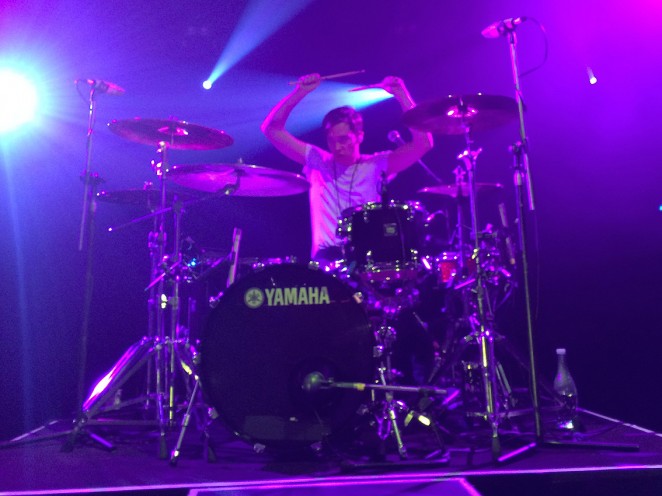
How do you reckon someone like Keith Moon would go as a modern day drummer?
I have seen some videos from the last tour and studio with Keith and they had to actually Gaffa tape the ear-phones to his head so they would stay put. There are some hilarious photos with these massive head phones and silver Gaffa tape wrapped around his head. With songs like Baba O’Reilly they were playing to really early versions of backing tracks that were run off reel to reel tape. Yes I think he would struggle a little bit.
What’s on for the rest of year?
I have quite a lot on the books. I’m basically sitting in front of my computer trying to coordinate how I am going to manage all of these shows I have said yes to and all of the projects I have signed on for. The biggest and most exciting one for me is Bertie Blackman. She has an album coming out on October 3rd and myself and Ross James produced and co wrote two tracks off the record. I am MD and drums for all of her live shows. Also doing some recording with Kirin, working on his second album. We’ve done a little bit so far, some drums and strange percussion. And touring with Eves and my band as well. We have a couple of shows supporting Andy Bull. It’s going to be fun because we have never played live before.


